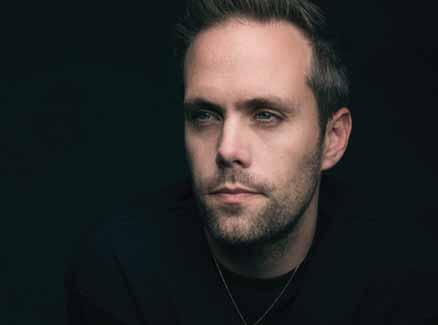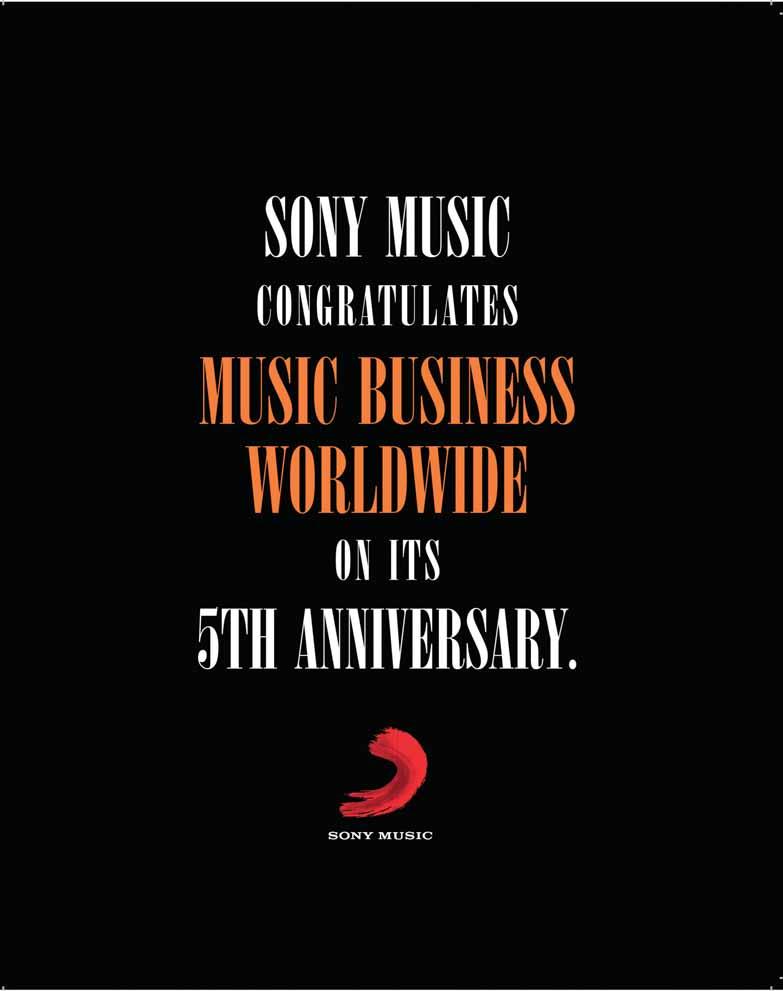
14 minute read
Katie Vinten, Facet/Black Diamond Management
Katie Vinten is clearly not someone who does things by halves. After co-founding Facet Records and Facet Publishing alongside Justin Tranter in 2018, she’s recently added yet another string to her bow with the arrival of Black Diamond Artist Management.
This entrepreneurial leg of Vinten’s career follows a successful 10-plus years in publishing at EMI and Warner Chappell, during which time she signed some of the most successful pop writers and artists of today including Tranter, as well as Julia Michaels, Hailee Steinfeld, Kygo and Christina Aguilera.
Vinten’s new trio of companies will allow her to back talent from multiple angles, leaning on Tranter as creative support where appropriate.
“When I was solely a music publisher, one of my frustrations was that the capacity of a publisher is limited,” she explains. “If a seat is already filled and the contract is signed, there is nothing you can do about it. I wanted the ability to be impactful in the career of any creative that I have a connection with.”
She adds: “The growth of myself as an executive in general is exponential when it comes to being able to wear different hats and really push myself.”
Vinten grew up in North Carolina listening to singer/ songwriters on local radio — Natalie Merchant was the first cassette she bought — as well as her parent’s favorites, Hall & Oates and Whitney Houston.
As her tastes developed, she graduated to John Mayer, Norah Jones, and Lauryn Hill, but also spent a period being fully enamored with pop, skating around the local ice rink to the biggest boy bands of the ‘90s like Hanson, Backstreet Boys and NSYNC.
At school, she says, she was a hard-worker with solid grades and a lackluster social life thanks in part to a shy demeanor and studiousness.
A short story written about a musician at the end of his life who’d never shaken the ‘tortured artist’ mentality gave Vinten a foot in the door at the NYU Tisch School of Arts, which led to internships at MTV, Verve and Sony.
As the music industry started to migrate from New York to LA, Vinten moved with it upon graduating, finding a temp gig at UMPG before joining EMI as an assistant.
There, she made an impression on then-CEO Jon Platt after bringing Mozella (who she’d fallen in love with at a gig in New York) into an A&R meeting and signing her to the company shortly after.
Platt needed a new assistant and Vinten stepped up to the plate, later moving with him to Warner Chappell as Director of A&R for Pop.
By the time she stepped into a consultancy role at Warner Chappell, in order to launch Facet Publishing in partnership with the major in 2018, Vinten was coHead of A&R.
Today, she still consults for Warner Records, acting as Rita Ora’s Stateside A&R, while she continues to look after Michaels, Kygo, K.Flay, and Aguilera for Warner Chappell.
Her initial roster at Black Diamond includes Tranter, Zach Skelton (Jonas Brothers, Lil Nas X), Boy Matthews (Gallant, Hayden James) and Caroline Pennell.
Facet Records (launched in partnership with Warner Records) serves as home to Diana Gordon and Shawn Wasabi, while Facet Publishing represents writers Kennedi Lykken (Ariana Grande, Dua Lipa, Chainsmokers, Jonas Brothers), Jason Gil (Katy Perry), Wes Period (Facet/Interscope Records), Shea Diamond (Facet/ Asylum), Brandon Colbein (ZAYN, Hayley Kiyoko), and The Roommates (Aaron Carpenter).
Here, we chat to Vinten about lessons learned across her career to date and championing creative talent in a challenging industry...
You say you were studious at
school because you had a drive to find a better life. What was it about your childhood that instilled that motivation, and what did better look like? Better looked like the ability to feel joy in what you are committing so much of your life to, which for me happens to be work and family. I’ve always wanted a family and wanted to be successful with creative things, and music was what found me.
In order to have a stable environment and build a family that feels like they have a foundation that’s not going to be pulled out from under them at any time, I needed to be great at what I did, not just good. I wanted to show my future kids that anything is possible and you don’t need to be born into wealth or connections, you just have to fulfil your potential and know that there is no ceiling.
My dad passed away a couple of months ago and he was an
Justin Tranter
extremely smart man when it came to book-smart, but he suffered a lot with his mental issues, untreated. When he was good he was good and when he was bad it was pretty bad.
What made me so sad at the end of his life was that he had so much unfulfilled potential and that the cycle hadn’t been broken — how his mum had treated him, he hadn’t broken that cycle with us. He made a decision, whether it was conscious or unconscious, to give in to his own insecurities and not seek the help he needed.
That was heartbreaking for me because I felt like that is an example of someone who has all of these abilities, who is so intelligent in many ways, and was lacking that emotional intelligence to really fulfill their full potential. How much that held him back… the need to be right all the time, the need to not [ask for] help from anyone.
Seeing that made me be like, I’m not too proud to ask for help or ask questions, I’m not too great to do menial tasks.
I’ll never allow myself to be disrespected, but I will put my best foot forward and I always have something to learn. 112
What lessons did you learn during your early career that have had an impact on the way you work and run your company today? For no-one in the building who shows up every day to ever be treated as insignificant. Everyone is trying to do their best and until you can give reason that proves something different or that this is not something that someone’s heart is in, you have to give people the benefit of the doubt.
I saw how people can treat people beneath them, like everyone is replaceable, and I really don’t feel that way. Right now, in my company, I am nothing without the people that work beside me. I want them to feel part of the vision I have for building this company, that it’s our vision and that they are appreciated.
Also, every now and then I saw women in the industry who I mostly thought were assistants at that time [plus] a few executives. I could see the fear that a lot of them, and any marginalized person in rooms of power, have to voice their opinions.
That was so off-putting to me; I can’t work in an industry where I feel that way, I can’t grow and subscribe to that way of thinking. I promised myself that even when dealing with someone in a much more powerful position, I was going to stand my ground and have an opinion because... what else am I here for?
I want to move culture, music and my life forward, and the betterment of the people I work with forward, and that means I can’t be afraid.
You’ve worked very closely with Jon Platt — what was that experience like and what did you learn from him? I learned a lot. He made his name in more of the urban music community, and that was not a community that I had come from musically, so it was an amazing challenge to get to know people in that world and establish relationships which I never would have established had I just worked under somebody who came up in pop music.
Jon’s one of the hardest workers in the music industry and he expected that of the people that he worked for and with. He really pushed me and made me more resilient than even I thought I could be.
Even though he was tough, he saw the potential in me, he opened doors and encouraged me to walk through them. There was no hand holding or micromanaging. He was like, as long as my stuff is on point, then all this other stuff, the creative and relationships and bringing things in to sign, you’ve got my support.
That meant the world to me because all I’ve ever wanted was an opportunity, to succeed or to fail. He gave me that.
What’s your approach to A&R and working with artists today? Now I’m a mother and have a three and a one-year-old, my approach is that everybody who I work with, whether it’s
a songwriter, producer, or a recording artist, is somebody’s son or daughter. I approach my care for them and their career like I would want someone to care for my kid’s career or passion; with a sense of accountability and honesty in doing what [I] said [I was] going to do.
I don’t want anyone to be at the end of their life that I’ve worked with who, as I’ve seen with my father and other people, has potential unrealized. My main purpose is to get every ounce of potential out of someone’s ability and help them see it for themselves – and then help other people see [it]. Then everything else falls into place.
What do you look for in new signings? Number one is talent; number two is that they have the integrity and the drive to see those days that are tough through; number three is somebody that I want to speak to every single day.
It has to be somebody where I feel honored to be a part of their journey and they feel honored to be a part of mine. I’m way more intentionally specific now because [Facet/Black Diamond is] a company that I launched and every signing and moment matters.
You’ve played a key role In Justin Tranter’s career. You continue to champion and work very closely alongside him. What is it about him that’s special to you? He is an unapologetic truthseeker. A lot of people go into rooms with artists and try to force that artist just to write the hit song.
Justin is a human being and approaches things from a perspective of, ‘Music shifts culture and elevates humanity, but what are you going through? What is it that you want to say, what is it you’ve been afraid to say or what is it that you have
Tranter, Aaron Bay-Schuck and Katie Vinten

said that we can say better, and how can I help elevate that?’ As opposed to saying, ‘Well I’m a hit songwriter so just listen to me and this is the song you should put out’, or, ‘My chorus is better.’
Justin always starts a session by showing the artist he actually cares and he’s honored that he’s there. There is a respect from moment one. I don’t think a ton of songwriters understand the importance of that – he does and it’s the through-line in everything he does.
There is no formula for Justin other than wanting to try to get to the truth, even if that truth is pure joy. Cake By The Ocean is just the most fun [song], the minute you hear it you just want to dance and that is the purpose. So it doesn’t have to be heavy [hearted], but at the same time if that’s what a session calls for, he will elevate that as well.
What’s the most challenging thing about publishing today? Now that I’m [in amongst] more of the joint ventures, the smaller publishing companies, but with the backing of the amazing Warner Chappell, I would say that there are a lot of high dollar figure advances given out with the promise of providing creative services, and this feeling that [a big advance] means somebody believes in [talent] more when I honestly don’t think that’s true.
The fact that there are so many large checks flying around without context, without relationship, makes it very confusing for songwriters who are trying to find their way and make a living, and deciding between building a bigger pie with somebody who is actually going to work them as a songwriter versus a [large upfront check].
The dollar amounts have become so inflated that it can give publishers a bad name. It’s hard for the person who is giving a great deal and is also going to give creative services, who may get counted out [versus someone who can pay more upfront] when a great publisher can be one of the most influential pieces of a creative career. That happy medium that will be found eventually, but right now everything is very inflated.
Spotify has come under fire for its treatment of songwriters after opposing the CRB rate hike. 113
Diana Gordon
What’s your opinion on that move and whole debate over the fair treatment of songwriters from streaming services? Songwriters are the lifeblood of this industry and streaming platforms are absolutely amazing to discover new music and give artists and songwriters an opportunity to have their music heard. There is a balance that has yet to be achieved and I think it’s more of a systemic cultural problem – one that has been rooted in the history of [songwriting] being more of a female-driven art form.
In many ways, as we know, marginalized people in general have had to work twice as hard to get the same amount as nonmarginalized people.
So I think [this situation] is much less about the tech boom and digital service providers being ‘evil’, than it is something deeply rooted which culturally needs to shift.
With any conflict, being on opposite sides of the table never really works – you’ve got to get on the same side of the table and there are some amazing songwriters who are making that pledge. There has to be a 114 conversation that really gets it down to the human experience and why this matters to songwriters and why it should be understood.
At the core of it is: Let’s treat marginalized people fairly, the women and LGBTQ people who write these incredible songs, and really respect the craft on a level that it deserves.
There is a lot of re-writing of history that needs to be done in order to achieve that... we just have to push forward, get on the same side of the table and have more productive conversations and less anger.
The songwriters we should really be fighting for are the people who barely make anything, the mid-tier writers who don’t have a big hit single yet. It’s got to be less about specific [successful] writers, ‘I deserve to be paid’, and more about the fact that this community deserves to be able to make a living – and not everyone in this community is going to have the big radio hit and millions of dollars. We have to protect those that are coming up beside us, below us, however you want to say it, so this can be an actual career and not a hobby.

You were one of the signatories calling for the resignation of ex-Grammys boss Neil Portnow following his ill-fated ‘step up’ comment. How positive do you feel about equality in the music industry today? I think it’s still pretty interesting that whether it was #metoo or these comments [from Portnow], it comes and then it totally goes. Unlike the film industry, it just seems like it hasn’t impacted in the same way in the music industry, that people still can be pretty horrible for quite some time and get away with it. But there are a lot of good people in the industry and us good people are really using our voice more than ever – that matters.
It’s also up to us as people of influence to make way for our fellow females and marginalized people in general. We have to lift them up and recognize their talent. We cannot be afraid to say something because it may impact a relationship of someone who is providing a lot of opportunities for a writer or an executive.
Success is never an excuse for any form of abuse or poor behavior and people need to not be afraid of the repercussions [of speaking up] because life should be about more than that.
This is music and music is supposed to shape culture, so it’s ironic that the music industry tends to forget about the wrongdoings of people and just push it aside.
With that said, a lot of women, the LGBTQ community and people of color are really using their voice more than ever today. I think the more charitable and the more giving of themselves that creatives and executives can be, the more we can diminish the darkness that has taken [root] in every industry at times, and shine the light on the good stuff.
This interview first appeared on MBW in October 2019.












